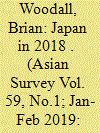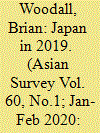|
|
|
Sort Order |
|
|
|
Items / Page
|
|
|
|
|
|
|
| Srl | Item |
| 1 |
ID:
164948


|
|
|
|
|
| Summary/Abstract |
New and old domestic issues challenged the Abe government, while “Trump shocks” rattled Japan’s foreign relations. Domestically, Abenomics produced mixed results, the depopulation bomb continued ticking, and Abe’s reelection presaged a possible attempt at constitutional amendment.
|
|
|
|
|
|
|
|
|
|
|
|
|
|
|
|
| 2 |
ID:
172460


|
|
|
|
|
| Summary/Abstract |
In 2019, Japanese Prime Minister Abe grappled with domestic dilemmas and diplomatic strains, highlighted by inflamed relations with South Korea. The economy continued to grow slowly, the depopulation bomb continued ticking, and demands for gender equality grew louder. The year also brought the enthronement of a new emperor and genesis of a new imperial era.
|
|
|
|
|
|
|
|
|
|
|
|
|
|
|
|
| 3 |
ID:
105793


|
|
|
|
|
| Publication |
2011.
|
| Summary/Abstract |
In June 2010, the Japanese cabinet adopted a new Basic Energy Plan (BEP). This was the third such plan that the government has approved since the passage of the Basic Act on Energy Policy in 2002, and it represents the most significant statement of Japanese energy policy in more than four years, since the publication of the New National Energy Strategy (NNES) in 2006. Perhaps more than its predecessors, moreover, the new plan establishes a number of ambitious targets as well as more detailed measures for achieving those targets. Among the targets are a doubling of Japan's "energy independence ratio," a doubling of the percentage of electricity generated by renewable sources and nuclear power, and a 30 percent reduction in energy-related CO2 emissions, all by 2030. This paper explains the origins of the 2010 BEP and why it was adopted. It then describes the content of the plan and how it differs from the NNES. A third section analyzes the appropriateness of the new goals and targets contained in the BEP and their feasibility, finding that achievement of many of the targets was likely to be quite challenging even before the March 2011 earthquake, tsunami, and nuclear crisis.
|
|
|
|
|
|
|
|
|
|
|
|
|
|
|
|
|
|
|
|
|